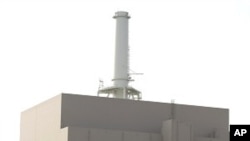A power company in central Japan says it is suspending operations at the country's fourth largest nuclear power station until it makes safety improvements.
Monday’s announcement comes after Japan's Prime Minister asked the plant to halt operations because of concerns over the facility’s vulnerability to earthquakes and tsunami.
The Hamaoka plant of Chubu Electric Power sits on the Pacific coast in an area that seismologists say is long-overdue for a massive earthquake. By one government estimate, there is an 87 percent chance that a quake of magnitude eight or higher will strike in the next 30 years.
The worry is that a huge quake could knock external power supplies offline and cause a tsunami that would inundate the plant, which is the same thing that happened at the Fukushima Daiichi power station.
The government has requested Hamaoka suspend operations until safety improvements can be made.
Chubu Electric President Akihisa Mizuno announced the decision at a news conference.
Mizuno says the company has decided to stop reactors 4 and 5 and postpone plans to restart reactor 3, which is currently stopped for maintenance.
On Friday, Japanese Prime Minister Naoto Kan asked the company to stop Hamaoka, but he did not have legal authority to do so. Chubu Electric's board met Saturday and resisted the prime minister’s call.
The Japanese government has said it will work with the privately-run company to cover the extra expense of halting the plant’s operations.
The suspension could limit the electricity supply in central Japan. Hamaoka supplies one-tenth of the power used in the region, which is home to numerous factories including the headquarters of Toyota, the world's biggest car maker.
Companies are already voluntarily reducing power use. There are worries that a hot summer could bring mandatory power cuts and disrupt factories.
Chubu Electric can restart older coal and gas-fired plants that had been taken out of service, but that will only make up about half the shortfall of the Hamaoka plant.
The decision is a victory for anti-nuclear groups that have long labeled Hamaoka as the country's most dangerous nuclear power plant.
Calls for its closure have been made at rallies in Japanese cities almost every week since the nuclear emergency began unfolding in Fukushima.




